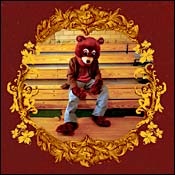
Like Timbaland and the Neptunes, hip-hop producer Kanye West is such a ubiquitous hit-maker that he has become an artist (and star) in his own right. But listeners connect to West’s productions in a very different way than they do to his fellow behind-the-boards auteurs: It’s not technique they’re reacting to (though West is a virtuoso sampler, mining everything from sixties psychedelia to swing) but the vulnerability that comes through in his songs.
The College Dropout—West’s debut as producer and rapper—is a sprawling and undisciplined mess (there are far too many skits, and several of the songs appear on mix tapes or on other rappers’ records), but it’s fully attuned to what made West so compelling in the first place, namely chunks of samples that feel raw and convey an underdog sensibility. With rhymes like “I used to work at the mall / with nothing at all / seeing niggas ball / that was fucking depressing,” West snatches realness back from cynical gangstas. And he makes autobiography universal in a way that hasn’t really been heard in hip-hop since the mid-nineties. His emotional brand of hip-hop could actually alter the genre’s compass, which has for too long been pointed toward the unsatisfying, dishonest direction of street cred. How remarkable that a producer who outfitted himself in a bear costume—not wearing watches or surrounded by women—for his CD cover tapped so deeply into hip-hop’s consciousness.
Only the disco scene of the early seventies could have accepted a true outsider like Arthur Russell, disco’s greatest auteur. An Iowa-born cellist, he came to New York via a Buddhist commune in San Francisco and found his calling on the dance floors of downtown nightclubs like the Gallery and Paradise Garage. Two new compilations—The World of Arthur Russell and Calling Out of Context—wrestle with Russell’s wild, weird legacy, an improbable mix of folk, classical, soul, and Buddhist chants that was almost always captivating and occasionally even pop. The poet Allen Ginsberg once called it “Buddhist bubble-gum music.”
“West makes autobiography universal in a way that hasn’t really been heard in hip-hop since the mid-nineties.”
As its title implies, The World of Arthur Russell is a broad, survey-style take on Russell’s career; that doesn’t mean, however, that any of it will be familiar outside of a small circle of disco obsessives. Here, Russell’s totemic pure-disco productions—the loping bass lines of double entendres of “Is It All Over My Face?,” both of which are endlessly sampled by hip-hop and dance-music producers—sit alongside sweet, contemplative cello pieces (“Keeping Up”). Yet other than “Pop Your Funk” (in which Russell’s sensual, reedy cello-playing rubs up against churning, pistonlike percussion), World proves that Russell, who died of aids in 1992, too often kept his passions starkly segregated.
This is why Calling Out of Context is a revelation. Russell was far more at ease fusing his interests on the unreleased tracks that make up Calling Out, smartly curated by longtime admirer Steve Knutson, and like a good Buddhist, he did more with less. Russell crafts hypnotic sonics (tabla playing, a serrated keyboard sound) that are repeated over and over or simply held steady—and the effect is something like an electronic om. His strange vocals work better, too; on his original tracks, his high-pitched and slow delivery often sounded affectless, soft-rock-like, but here they help Russell dissolve into the music.
This music was always a dive into oceanic sounds, but the songs of Calling Out make his need to get lost all the more explicit. Whether it’s a literal dip in the water (“The Platform on the Ocean”) or Russell simply losing himself in love, Calling Out is music not as escape but as transcendence.